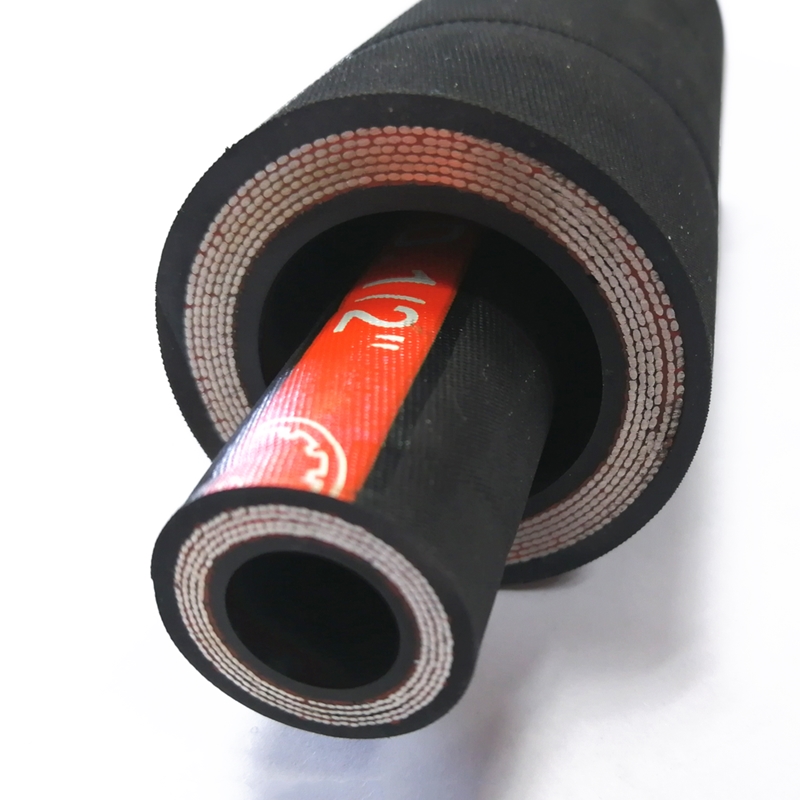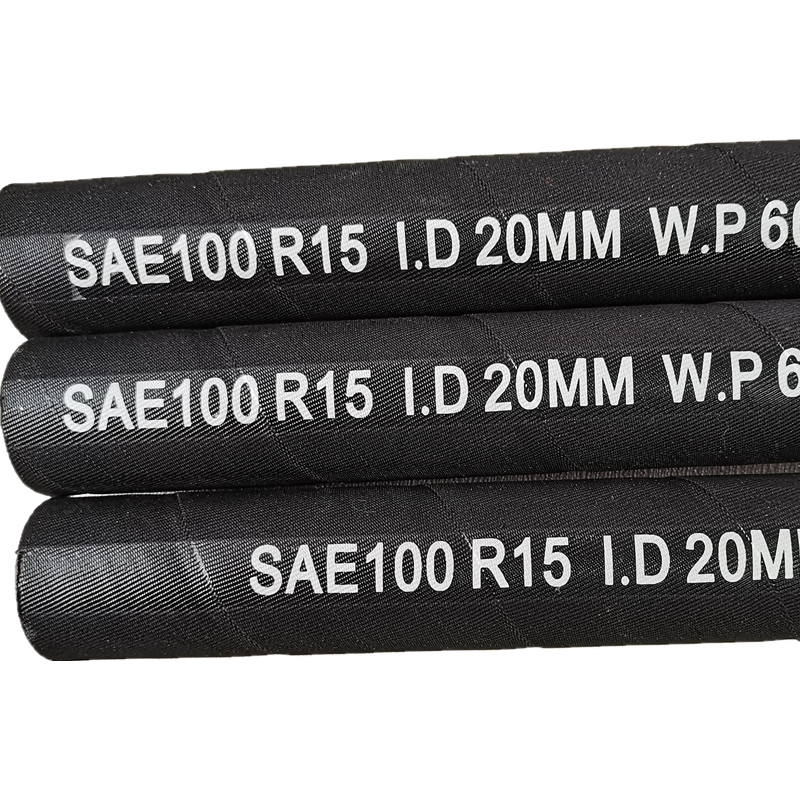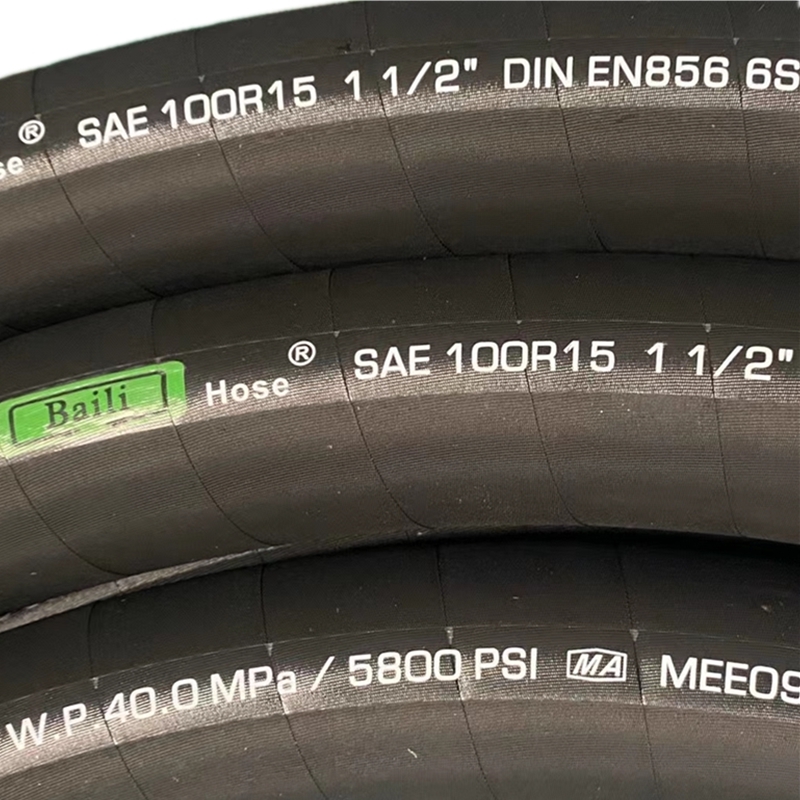jul . 28, 2025 08:01 Back to list
Durable 1/2 ID Rubber Hose for Industrial and Automotive Use
The demand for 1/2 id rubber hose and its related products such as 1/4 rubber air hose, 3 4 inch rubber hose, 3/4 id rubber hose, braided rubber hose, gates rubber hose, heat resistant rubber hose, power steering rubber hose, rubber air brake hose fittings, and rubber air hose 3 8 has steadily risen owing to their adaptability and robust performance in diverse industrial scenarios. In this comprehensive report, we dissect current trends, manufacturing techniques, core parameters, and real-world application cases, primarily showcasing the EXTRA HIGH PRESSURE HYDRAULIC HOSE SAE 100 R15 (product link).

Industry Trends & Market Demand
According to Grand View Research, the global industrial hose market is projected to reach $22.6 billion by 2027, at a CAGR of 9.9%. The largest contributors to this growth include construction, automotive, and petrochemical industries, all of which rely on robust solutions such as 1/2 id rubber hose for high-pressure fluid transfer, pneumatic applications, and hydraulic equipment.
Technical Specifications: 1/2 ID Rubber Hose & Related Products
| Product | Internal Diameter (in/mm) | Working Pressure (bar/psi) | Burst Pressure (bar/psi) | Min. Bend Radius (mm) | Material | Reinforcement | Temp. Range (°C) | Typical Application | Standard Compliance |
|---|---|---|---|---|---|---|---|---|---|
| 1/2 id rubber hose | 0.5"/12.7 | 180/2600 | 720/10400 | 100 | NR/SBR/Synthetic Rubber | High-tensile steel wire braid | -40~120 | Hydraulics, Air, Oil | ISO 1436 |
| 1/4 rubber air hose | 0.25"/6.3 | 100/1450 | 400/5800 | 70 | EPDM/NBR | Textile/cotton braided | -30~100 | Pneumatic tools | EN 559 |
| 3/4 id rubber hose | 0.75"/19 | 125/1810 | 500/7250 | 130 | SBR/EPDM | Textile braided | -35~110 | Fluid transfer | SAE 100R6 |
| braided rubber hose | 0.25-2"/6.3-52 | 100-450/1450-6525 | 400-1800/5800-26100 | 80-220 | Synthetic rubber | Steel wire braid | -40~120 | Industrial, Auto | SAE J517 |
| heat resistant rubber hose | 0.5-2"/12.7-50 | 100-180/1450-2610 | 400-720/5800-10400 | 110-180 | EPDM, silicone | Textile/steel | -40~150 | Steam, engine bay | ISO 6134 |
| gates rubber hose | 0.25-2"/6.3-52 | Up to 420/6090 | 2100/30450 | Varies | Multi-blend | Multi-wire braid | -40~125 | OEM/Aftermarket | OEM/ISO |
| rubber air hose 3 8 | 0.375"/9.5 | 150/2175 | 600/8700 | 80 | NR | Cotton/Textile | -30~100 | Compressed air | EN 559 |
Manufacturing Process: 1/2 ID Rubber Hose
The quality and durability of a 1/2 id rubber hose are primarily determined by raw materials, reinforcement, and precision in manufacturing. Below is a visualized step-by-step workflow:
- Raw Material Mixing: Blending natural/synthetic rubbers (NR/SBR/EPDM), plasticizers, reinforcement fibers, and additives as per formula.
- Extrusion & Tubing: The blended mixture is extruded into the desired diameter tube, forming a seamless core.
- Wire Braiding/Spiraling: High-tensile steel wires are braided/spiraled for reinforcement, providing burst resistance and flexibility.
- Rubber Jacketing: The outer layer is applied by extrusion, enhancing abrasion, oil, and weather resistance.
- Vulcanization: The assembly undergoes high-pressure steam vulcanization (150–180°C), cross-linking rubber molecules for strength and elasticity.
- Testing & QC: Every batch is tested for pressure, flexibility, abrasion, and dimensional accuracy as per ISO 1436 standards.
- Logistics: Product is cut to length, marked, packaged, and shipped.
For an animated manufacturing demonstration, view this relevant hose production video.

Key Material Insights and Standards
- Rubber Compounds: Most 1/2 id rubber hose employ NR (natural rubber), SBR (styrene butadiene), EPDM (ethylene propylene diene monomer) for oil/hydrocarbon and weather resistance.
- Reinforcement: High-tensile steel wire braid (1–4 layers) ensures thermal stability and immense burst pressure.
- Jacketing: Outer jacketing is customized (smooth or wrapped finish) for specific abrasion, chemical, or flame resistance requirements.
- International Standards: Critical references include ISO 1436, SAE J517, EN 853, and FDA for food-grade hoses.
- Testing: ISO/ANSI requires 2x–4x static burst pressure, flexibility, oil resistance, elongation, and permeation tests.
Technical Parameters Trend & Visualization
The chart above illustrates recent improvements in working pressure and temperature resistance for top-selling 1/2 id rubber hose over five product cycles, underscoring rapid R&D-driven optimization.
Case Study: Power Plant – EXTRA HIGH PRESSURE HYDRAULIC HOSE SAE 100 R15
- Project: Coal-fired power station in Malaysia, 2023
- Application: Hydraulic actuation for turbine control (pressures up to 5000 PSI)
- Product Used: EXTRA HIGH PRESSURE HYDRAULIC HOSE SAE 100 R15
- Advantages: Fatigue life exceeded 1.2 million impulse cycles, 50% lower permeability, operated reliably in high-humidity and corrosive conditions.
- Reference: Hydraulics & Pneumatics Magazine – Hose selection article
Product Comparison & Technical Data Visualization

| Product | Working Pressure (bar) | Burst Pressure (bar) | Impulse Cycles | Temperature Range (°C) | Bend Radius (mm) | Reinforcement | Main Market |
|---|---|---|---|---|---|---|---|
| EXTRA HIGH PRESSURE HYDRAULIC HOSE SAE 100 R15 | 420 | 1680 | 1,200,000+ | -40~121 | 190 | 4/6-wire spiral | Energy, Oil & Gas, Mining |
| Standard EN 853 2SN | 165 | 660 | 200,000+ | -40~100 | 110 | 2-wire braid | General Industry |
| SAE 100 R13 | 350 | 1400 | 900,000+ | -40~121 | 180 | 4-wire spiral | Heavy Construction |
Custom Solutions: Tailoring 1/2 ID Rubber Hose to Industrial Needs
- Dimensions/Length: Custom-cut to millimeter accuracy (standard and non-standard lengths).
- Pressure Class Upgrade: Increase braided layers for up to 250% rated working pressure.
- Temperature & Chemical Resistance: Selection of unique polymers (e.g., fluorosilicone for acid/alkali environments).
- Fittings & Connectors: Crimped, reusable, NPT/BSP-thread, or quick-connect by project need.
- Color Coding & Marking: For traceability and operational safety (custom print, color, logo).
- Quality Documentation: ISO/ANSI/FDA compliance certification, full batch traceability, test reports.
Application Scenarios & Customer Feedback
- Oil & Gas: High-pressure delivery lines, wellhead equipment (compliant with ISO 13628-5).
- Metallurgy: Lubrication and hydraulic actuation in steel rolling mills.
- Chemicals: Transfer of aggressive fluids (acid/alkali) with lined hoses.
- Construction: Pneumatic power, water lines, and concrete irrigation.
- Automotive: Power steering and brake system hoses follow FMVSS 106 regulations.
- Agriculture: Spray equipment and fertilizer distribution systems.
Client Testimonial – Petrochemical Plant
"Switching to EXTRA HIGH PRESSURE HYDRAULIC HOSE SAE 100 R15 led to a 40% reduction in downtime and over 320,000 cycles without failure. Exceeded expectations for chemical resistance and burst pressure."
— Chief Maintenance Engineer, Australasia Region
Authoritative Qualifications & Collaboration
- ISO 9001:2015 Certified Manufacturer
- Service for major OEMs: Caterpillar, Siemens Power, CNPC
- Annual output: 30 million+ meters of industrial hose
- Over 15 years focus on high-pressure hydraulic solutions
- All hoses rigorously tested to ISO 1436 and ANSI/SAE standards
- Third-party audits: SGS, Bureau Veritas
FAQs: Deep Technical Terms on 1/2 ID Rubber Hose
A: Typically, the tube is made from a blend of NR, SBR, or EPDM based on oil, ozone, and abrasion resistance, with steel wire or textile as reinforcement.
Q2: How is the pressure rating defined?
A: Pressure rating is determined by the number of reinforcement layers and material strength. For example, a single steel wire braid offers up to 2500 PSI; multi-spiral can exceed 6000 PSI (per ISO 1436).
Q3: What installation standards should be observed?
A: Follow SAE J1273 and ISO/TS 17165-2 for routing: avoid tight bends (minimum bend radius per spec), keep hoses clear of abrasive/corrosive contact.
Q4: What is the typical lifespan of a high-quality 1/2 id rubber hose?
A: 3-8 years under normal working conditions, over 1 million impulse cycles (backed by actual batch test data).
Q5: What quality control measures are in place?
A: 100% hydrostatic test, burst test (at minimum 4x rated pressure), elongation, cold-oil leakage, and dimensional checks.
Q6: Are customized fitting options available?
A: Yes, including NPT/BSP thread, SAE flanges, quick-connect couplings in steel, brass, or stainless for various standards.
Q7: How can hoses be ensured to be compliant with food or pharmaceutical standards?
A: Inner tube is made using FDA-approved rubber, manufactured in ISO 22000-protocol cleanrooms where required.
Lead Time, Warranty, and Customer Support
- Production Lead Time: Standard sizes ready in 7–12 days; Custom configurations 2–4 weeks, depending on raw material availability and volume.
- Warranty: 24 months from shipment against manufacturing defects (terms per official documentation).
- After-Sales: 24/7 technical hotline; on-site installation, commissioning, and troubleshooting support for key accounts.
- Certifications Supplied: Mill test certificate, pressure proof report, ISO/ANSI certificates upon delivery.
Why Select EXTRA HIGH PRESSURE HYDRAULIC HOSE SAE 100 R15?
- Unparalleled fatigue life (1,200,000+ cycles, ISO 6803 proven)
- Superior pressure rating (up to 420 bar / 6090 PSI)
- Outstanding oil, flame, and ozone resistance (ISO 15540 flame test compliant)
- Quick lead time, reliable warranty, and excellent global after-sales
- Custom engineering—length, color, fitting, and marking per customer need
References & Further Reading
- “Industrial Hose Market Size, Share & Trends Analysis Report.” Grand View Research, Link
- Hydraulics & Pneumatics. “Choosing The Right Hose,” Article
- ISO 1436:2020 Rubber hoses and hose assemblies—Wire-braid-reinforced hydraulic types—Specification, ISO
- “SAE 100R15 Hydraulic Hose Product Page.” Baili Hydraulics, Product Link
- Forum: Hydraulic Fluid Power—“Long Term Durability of Spiral Hoses,” ENG-TIPS Engineering
-
High-Quality Rubber Air Hose 3/8 – Durable, Flexible, Heat Resistant
NewsJul.28,2025
-
Durable 1/2 ID Rubber Hose for Industrial and Automotive Use
NewsJul.28,2025
-
Durable Rubber Air Hose 3/8 – Heat Resistant, Braided Options
NewsJul.27,2025
-
High Quality Rubber Air Hose 3/8 - Durable & Flexible Solutions
NewsJul.26,2025
-
High-Quality 1/2 ID Rubber Hose for Industrial & Automotive Use
NewsJul.25,2025
-
Durable 1/2 ID Rubber Hose – Flexible, Heat Resistant & Multi-Purpose
NewsJul.24,2025
